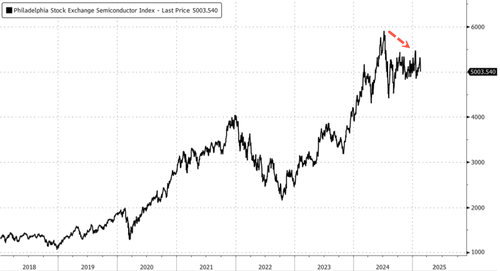Trump Seeks Tougher Chip Controls On China To Curb Advancements
Asian main equity indexes declined on Tuesday, pressured by a mix of broad risk-off sentiment, US equity degrossing, unfavorable seasonality trends, some technical factors, and profit-taking. Fresh concerns over President Trump's 'America First' policies further weighed on sentiment.
A report last weekend indicated that the Trump administration directed the Committee on Foreign Investment in the US to restrict Chinese investments in strategic sectors to safeguard national security interests.
However, this note focuses on a new Bloomberg report detailing Trump's efforts to curb China's chip advancements as AI enthusiasm erupts in the world's second-largest economy alongside soaring AI CAPEX spending.
Individuals familiar with Trump's upcoming chip restrictions on China informed Bloomberg about what's coming down the pipe:
Trump officials recently met with their Japanese and Dutch counterparts about restricting Tokyo Electron Ltd. and ASML Holding NV engineers from maintaining semiconductor gear in China, according to people familiar with the matter. The aim, which was also a priority for Biden, is to see key allies match China curbs the US has placed on American chip-gear companies, including Lam Research Corp., KLA Corp. and Applied Materials Inc.
The meetings come in addition to early discussions in Washington about sanctions on specific Chinese companies, other people said. Some Trump officials also aim to further restrict the type of Nvidia Corp. chips that can be exported to China without a license, Bloomberg News has previously reported. They're also having early conversations about tightening existing curbs on the quantity of AI chips that can be exported globally without a license, said some of the people, who asked not to be identified because the deliberations are private.
The timing of the new chip restrictions could "take months," according to Bloomberg, noting, "It remains to be seen whether allies will be more receptive" to additional restrictions on China's chip industry.
Goldman's Ananya Prakash in London commented on the ongoing trade situation:
Press reporting that Trump's administration is looking at tougher semiconductor curbs. GIR notes that the release highlights potential areas for increased scrutiny including US outbound investment to China, Chinese ADR standards, and companies on the Chinese Military Companies List. The memorandum suggests tighter controls on certain sectors like semiconductors and AI, possible changes to tax treaties, and stricter investment reviews.
Tokyo Electron shares closed down nearly 5% after the Bloomberg report.
Prakash provided clients with more color on semis action today:
Semis basket (GSSBSEMI) down 2.1% this morning, with its top constituents all down on the day as the US sketches out tougher versions of existing US semiconductor curbs against Beijing and pressures the Netherlands and Japan to escalate restrictions on China's chip industry. Most notably ASML down 3% today, following the news that Trump's team met with Japanese and Dutch counterparts, to discuss restricting ASML's engineers from servicing/maintaining their hardware, which is key in producing microchips.
The chart we're tracking is the PHLX Semiconductor Sector, which is trading 15% below its July 2024 peak.
Last week, Goldman's Fred Yin and Shubham Ghosh asked clients if US exceptionalism in big tech is over as the AI boom shifts to China...
US Exceptionalism Over? Alibaba Soars On AI As US-China Tech Valuation Gap "Must Narrow" https://t.co/2utJKaXsz0
— zerohedge (@zerohedge) February 21, 2025
Plus, there are mounting concerns about Microsoft data center order cancellations, per a new TD Cowen report. However, MSFT "strongly refutes" the report.
Loading...
